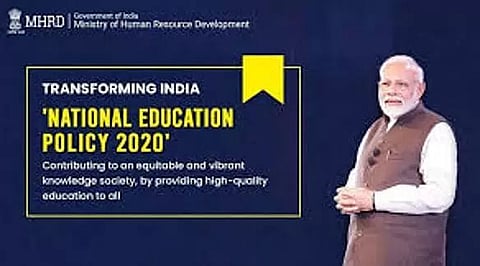
- Home
- Live Blog
- Breaking News
- Top Headlines
- Cities
- NE News
- Sentinel Media
- Sports
- Education
- Jobs

Ravindra Kumar Mishra
(Former Chief Consultant, Ministry of Education (formerly MHRD), GOI. Can be reached at rkmishrajee@gmail.com.)
The COVID –19 created a plethora of problems and disrupted the education system all over the globe. Simultaneously, it brought new opportunities, opened new doors of innovations and pushed to design an inclusive curriculum in consonance with National Education Policy (NEP) 2020.
Instead of adhering to the 'dogmas of the past the education segment thought and acted differently and school teachers, administrators and school leaders rose to the occasion by adapting to the need of the hour. Technological interventions which seemed impossible in previous years have now become possible and added a new dimension to the thought process with concerted efforts of educationists and technocrats, otherwise, it would have taken several years to implement it. Digital platforms came to the rescue as schools migrated to the online teaching-learning process.
Every system is bound to attract criticism and the Indian Education System is especially a target of many allegations from parents who want 100% for their kids, teachers think that they are engaged more in non-academic activities, academic authorities consider themselves overburdened and staffed etc. To stop these bucks, steps have been taken to reform and a lot more is the exigency especially when the omicron variant is a worry.
It is now time to look forward and focus on the trends of education that intends to shape the future. The NEP 2020 offers a golden opportunity to pilot changes. This is gaining momentum that was slowed in the turbulent years. State Academic Authorities have been entrusted to design and develop the state curriculum framework of school education envisaged as a 5+3+3+4 system, which in turn will be part of the national curriculum framework. The authority desires to convey unambiguous expression by removing ambiguity as children are the focus and learning is fundamental for making the country "Vishwaguru".
The law of nature "as you sow, so will you reap" holds good for the education system as quality school education is the foundation of higher education and productive human resource. Many studies reveal that transition from the bottom to higher education is low and their employability is anxiety. This merits the attention of the state academic authorities and education administration at large. The authorities may inclusively consider alternative ways of education to address learning and teaching gaps.
Acquaintance with the policy is the starting stage for better implementation. The expedition may begin with stakeholders' conversance with provisions and visions of the NEP 2020 and identification of the learning need of each child. COVID has created an ethos where children are learning individually. This entails teachers customising teaching-learning based on the needs of each child. Here professional development of teachers and their dexterity in online and offline pedagogy is the obligation of SCERTs and NCERT at the state and national level respectively.
Curriculum content, pedagogical innovations trained teachers are all generated by state academic authorities and the higher education system. Henceforth, a sustainable education system can be achieved with convergent and integrated school education and higher education.
School-based reforms largely depend on teacher training, curriculum and assessment system. There is a need to transform the system to value and build 21st-century skills at the teacher education institutions, to divulge it at the school level.
The path of NEP 2020 that has been stretched before us is inclusive, exciting and filled with challenges. The journey has begun. May it succeed in its endeavour!